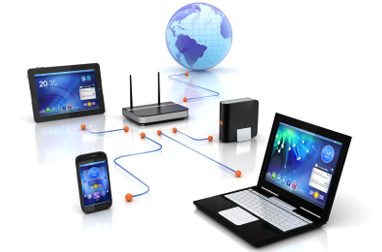

Nowadays the chances are that you already have your own network, although you may not realise it. If your internet provider has sent you a wireless router then you have a network; if not, then don't worry - a wireless router is fairly cheap for the needs of most home networks. However, having the hardware is only half the story - it's what you do with it that counts. The first thing you'll need is to share the internet amongst all of your devices, which we can help to set up. Beyond this you can share files between computers, watch movies & listen to music on your games console, or even add a printer to your network so that you can print from anywhere without having to invest in a new wireless one. There are many more advanced features available too, including parental controls and remote access.
Think this is of interest? Take a look at central storage and media streaming or give us a call to discuss your home network.
| Unsure of some of the terms we've used? We've handpicked a few definitions for you below, or you can visit our glossary for a comprehensive list. Click on 'read more' to see the full definition. | |
| Access Point: Access points provide access to wireless internet facilities. Usually access points are a more dedicated system than a simple router set-up, with access points used to extend wireless coverage across a large area from a wireless router or t... read more | |
| ADSL: ADSL, or 'Asymmetric Digital Subscriber Line', is a method of transferring data over telephone lines. In the UK, this is the most common way of connecting to broadband internet, with the alternatives being DSL (cable internet) or mobile int... read more | |
| Bandwidth: Bandwidth refers to the amount of data that is transferred through a network or over an internet connection, which is measured in bits per second. The higher your bandwidth is, the more data that can be transferred, so a high bandwidth woul... read more | |
| Broadband: Broadband is the high-speed internet connection that superseded the old dial-up connections that required the complete use of a phone line to connect to the internet. Whereas dial-up internet had a maximum speed of 56 kbit/s, broadband spee... read more | |
| Cable Modem: Cable modems are used to connect to a cable TV line rather than a phone line, usually giving a quicker and more stable connection through fibre optic lines rather than copper cables. If you use cable internet, a cable modem must be used rat... read more | |
| Cloud Computing: Cloud computing refers to various online services, particularly the ability to store, edit and retrieve your files online by using online data storage. The 'cloud' refers to the internet, representing the network of online services, and any... read more | |
| Ethernet: Ethernet is a collection of computer network technologies that are used in almost all local area networks (LANs). This is almost certainly the network technology you are using at home or at work. Standard speeds are 10, 100 and 1000 Mbps (m... read more | |
| Gateway: A gateway is a hardware or software program that acts as a bridge between two networks. For most users this will be their router, which acts as a bridge between their local home or business network and the internet. | |
| Internet Protocol (IP): Whilst most people refer to 'IP' as meaning their 'IP address', it actually means the standard set of rules for sending and receiving data through the internet and is the primary protocol that establishes the internet. It is also the most c... read more | |
| Internet Service Provider (ISP): An Internet Service Provider is the company that users sign up to in order to access the internet. ISPs usually provide not only the phone line or cable connection to the internet, but also the means to access the internet - usually a modem... read more | |
| LAN: LAN stands for Local Area Network, and is pronounced as 'Lan' rather than 'L-A-N'. A LAN is a network that is limited in size, usually within a business, school, university or house. LANs can be wired (using Ethernet) or wireless, using hig... read more | |
| Network: When two or more computers are connected together, they form a network. A network is simply a collection of computers and other devices that communicate with each other. These connections can be wired, wireless or a combination of both. The... read more | |
| Router: A router is a network device that forwards data between networks. The most familiar type of router is the router found in homes and small offices, which forward data between the local network and the internet. These routers are often suppli... read more |